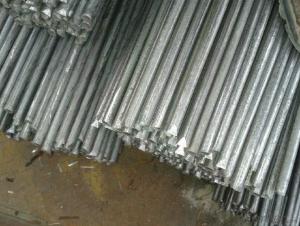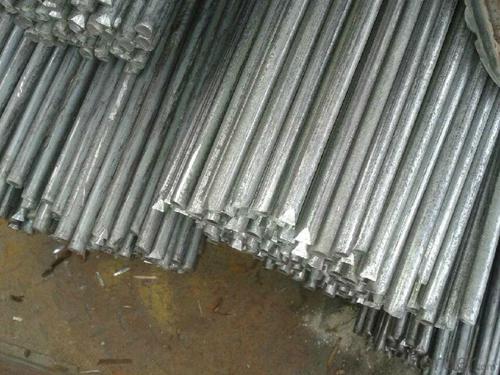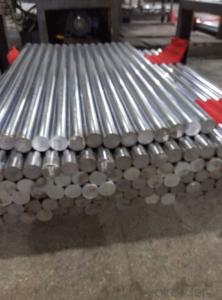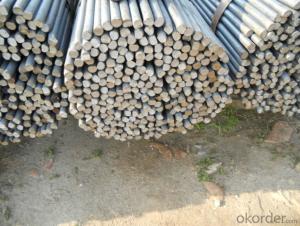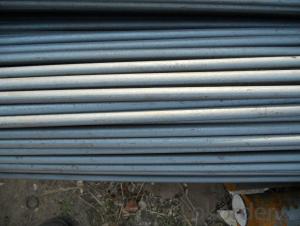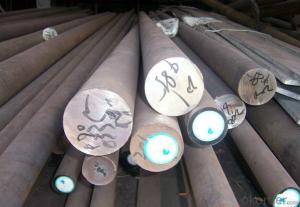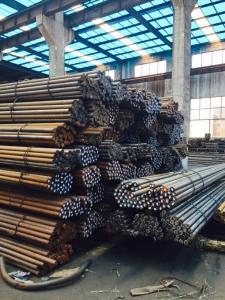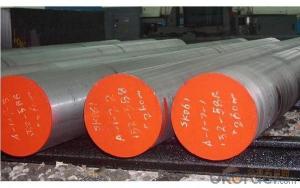Round Bar Chromed Steel Round Bar-Steel Round Bar S45C
- Loading Port:
- Tianjin
- Payment Terms:
- TT OR LC
- Min Order Qty:
- 25 m.t.
- Supply Capability:
- 20000 m.t./month
OKorder Service Pledge
OKorder Financial Service
You Might Also Like
Specification
Product Description:
OKorder is offering High quality Round Bar Chromed Steel Round Bar-Steel Round Bar S45C at great prices with worldwide shipping. Our supplier is a world-class manufacturer of steel, with our products utilized the world over. OKorder annually supplies products to European, North American and Asian markets. We provide quotations within 24 hours of receiving an inquiry and guarantee competitive prices.
Product Applications:
Round Bar Chromed Steel Round Bar-Steel Round Bar S45C are ideal for structural applications and are widely used in the construction of buildings and bridges, and the manufacturing, petrochemical, and transportation industries.
Product Advantages:
OKorder's Round Bar Chromed Steel Round Bar-Steel Round Bar S45C are durable, strong, and resist corrosion.
Main Product Features:
· Premium quality
· Prompt delivery & seaworthy packing (30 days after receiving deposit)
· Corrosion resistance
· Can be recycled and reused
· Mill test certification
· Professional Service
· Competitive pricing
Product Description:
1. Material: Alloy structural steels, carbon structure steels, alloy tool and model steels,etc.
2. Process: EAF + LF + VD + Forged + Heat Treatment (optional)
3. Delivery condition:Hot forged +Rough machined (black surface after Q/T)+ Turned (optional)
4.Technical Data: Chemical Composition, Physical Properties and Mechanical Testing.
FAQ:
Q1: How soon can we receive the product after purchase?
A1: Within three days of placing an order, we will begin production. The specific shipping date is dependent upon international and government factors, but is typically 7 to 10 workdays.
Q2: What makes stainless steel stainless?
A2: Stainless steel must contain at least 10.5 % chromium. It is this element that reacts with the oxygen in the air to form a complex chrome-oxide surface layer that is invisible but strong enough to prevent further oxygen from "staining" (rusting) the surface. Higher levels of chromium and the addition of other alloying elements such as nickel and molybdenum enhance this surface layer and improve the corrosion resistance of the stainless material.
Q3: Can stainless steel rust?
A3: Stainless does not "rust" as you think of regular steel rusting with a red oxide on the surface that flakes off. If you see red rust it is probably due to some iron particles that have contaminated the surface of the stainless steel and it is these iron particles that are rusting. Look at the source of the rusting and see if you can remove it from the surface.
Images:
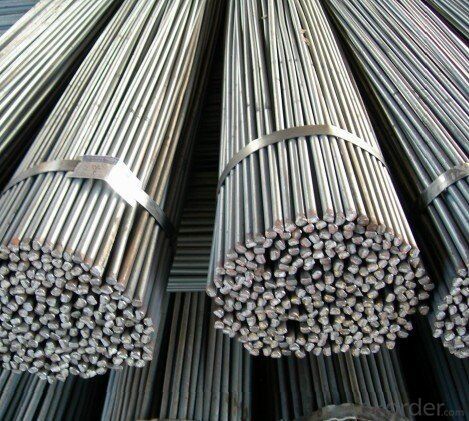
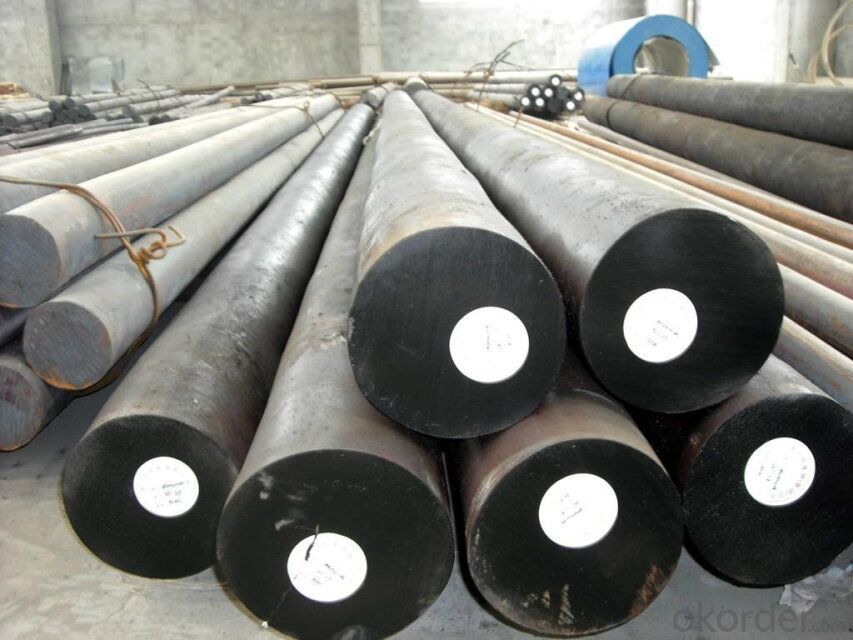
- Q: What are the advantages of using non-alloy steel round bars?
- There are several advantages of using non-alloy steel round bars. Firstly, non-alloy steel round bars are known for their high strength and durability. They have a higher tensile strength compared to alloy steel, making them suitable for various applications where strength is a crucial requirement. This makes them ideal for use in industries such as construction, automotive, and manufacturing. Additionally, non-alloy steel round bars have excellent weldability and machinability. They can be easily welded and formed into various shapes, allowing for flexibility in design and fabrication. This makes them convenient to work with and saves time and effort during the manufacturing process. Non-alloy steel round bars also have good corrosion resistance properties. They are less prone to rust and degradation, making them suitable for use in environments where exposure to moisture or corrosive substances is a concern. This corrosion resistance ensures the longevity and reliability of the steel bars, reducing maintenance and replacement costs in the long run. Furthermore, non-alloy steel round bars are cost-effective compared to alloy steel. They are more affordable and readily available, making them a cost-efficient choice for a wide range of applications. This affordability makes non-alloy steel round bars a popular choice for small-scale projects or businesses with budget constraints. Overall, the advantages of using non-alloy steel round bars include high strength, excellent weldability and machinability, good corrosion resistance, and cost-effectiveness. These qualities make them a versatile and reliable option for various industries and applications.
- Q: What is the difference between cast iron and round steel?
- Cast iron is composed of iron ore by crushing and grinding into powder, into the furnace after high temperature calcination into liquid (commonly known as iron) and then poured into the special mould after cooling into ingot is also called billet or iron, iron is the main component of alloy is composed of iron, carbon and silicon.
- Q: How are steel round bars tested for quality and strength?
- Steel round bars are tested for quality and strength through various methods to ensure they meet the required specifications and standards. One common test is the tensile test, which measures the bar's ability to withstand tension. During this test, a sample of the steel bar is subjected to a gradually increasing load until it reaches its breaking point. The maximum load it can withstand is recorded, along with the elongation and reduction in area of the sample. These values provide valuable information about the bar's strength and ductility. Another test used is the hardness test, which measures the resistance of the steel bar to indentation or penetration. This test is performed using a hardness testing machine that applies a specific force to a small indenter, such as a diamond or a steel ball, and measures the depth or size of the resulting indentation. The hardness values obtained can indicate the bar's strength and its ability to resist wear and deformation. In addition to these mechanical tests, steel round bars are also subject to non-destructive testing methods. Ultrasonic testing is commonly used to detect internal defects or inconsistencies in the steel bar's structure. This technique involves transmitting high-frequency sound waves through the bar and analyzing the reflected waves to identify any irregularities. Magnetic particle inspection is another non-destructive test that uses magnetic fields and magnetic particles to detect surface or near-surface defects in the steel bar. Chemical analysis is also crucial in determining the quality of steel round bars. This analysis involves testing the composition of the steel to ensure it meets the required chemical specifications. It helps identify the presence of impurities or elements that can affect the bar's performance and durability. Overall, steel round bars undergo a combination of mechanical, non-destructive, and chemical tests to assess their quality and strength. These tests provide valuable information to manufacturers, ensuring that the steel bars meet the necessary standards and are suitable for their intended applications.
- Q: Requirements for groove welding of grade 22mm round steel and manual arc welding
- If not on the lathe, in the groove on the round bar with gouging or cutting gun, docking form X type double sided bilateral docking, blunt edge 2mm root gap 2mm welding, welding side sincere one or two seam, flip the workpiece on the other side of a full weld groove, flip weld residual,
- Q: Can steel round bars be used in the construction equipment industry?
- Yes, steel round bars can be commonly used in the construction equipment industry. They offer excellent strength, durability, and versatility, making them suitable for various applications such as structural components, shafts, axles, and supports in construction equipment. The high tensile strength and resistance to wear and tear make steel round bars an ideal choice for heavy-duty machinery and equipment in the construction industry.
- Q: Are steel round bars suitable for machining operations?
- Yes, steel round bars are suitable for machining operations. Steel is known for its high strength and durability, making it an excellent material for various machining processes. Steel round bars can be easily shaped, cut, drilled, and turned to create precise components or parts. Machining operations such as milling, drilling, and turning can be efficiently performed on steel round bars to achieve the desired shape, size, and finish. Additionally, steel round bars offer good dimensional stability and excellent mechanical properties, allowing for accurate and consistent machining results. Overall, steel round bars are a reliable choice for machining operations in various industries including automotive, aerospace, construction, and manufacturing.
- Q: What is the tensile strength of a steel round bar?
- The tensile strength of a steel round bar can vary depending on the specific grade and manufacturing process. However, in general, steel round bars have a high tensile strength, typically ranging from 400 to 700 megapascals (MPa).
- Q: What are the different types of steel round bars used in the automotive drivetrain systems?
- There are several types of steel round bars commonly used in automotive drivetrain systems, including alloy steel, carbon steel, and stainless steel. These bars are chosen based on their specific properties and characteristics, such as strength, durability, and resistance to corrosion. The selection of the type of steel round bar depends on the specific application and requirements of the drivetrain system.
- Q: What are the advantages of using molybdenum-alloy steel round bars?
- There are several advantages of using molybdenum-alloy steel round bars in various applications. Firstly, molybdenum enhances the strength and hardness of the steel, making it an ideal choice for industries that require high strength materials. The addition of molybdenum improves the resistance to deformation under heavy loads, making the round bars more durable and long-lasting. Secondly, molybdenum-alloy steel round bars have excellent heat resistance properties. This makes them suitable for applications that involve high temperatures, such as in the manufacturing of heat exchangers, boilers, and furnace components. The steel's ability to withstand extreme temperatures without losing its strength and structural integrity is a significant advantage. Another advantage is the corrosion resistance provided by molybdenum. Molybdenum-alloy steel round bars exhibit superior resistance to corrosion in various environments, including acidic and alkaline conditions. This makes them an ideal choice for applications in corrosive industries such as chemical processing, oil and gas, and marine environments. Furthermore, molybdenum-alloy steel round bars offer excellent weldability and machinability. The molybdenum content ensures that the steel maintains its structural integrity during welding and machining processes, minimizing the risk of cracks or deformations. This ease of fabrication allows for greater flexibility in design and construction. In addition to these advantages, molybdenum-alloy steel round bars also offer good wear resistance, making them suitable for applications that involve abrasive conditions. Their ability to withstand wear and tear ensures a longer service life, reducing maintenance and replacement costs. Overall, the advantages of using molybdenum-alloy steel round bars include increased strength, heat resistance, corrosion resistance, weldability, machinability, and wear resistance. These properties make them a preferred choice in various industries where durability, reliability, and performance are essential.
- Q: Can steel round bars be used in the oil and gas industry?
- Yes, steel round bars can be used in the oil and gas industry. Steel round bars are commonly used in various applications within the industry, including drilling, production, and transportation of oil and gas. These bars are highly durable and offer high strength, making them suitable for withstanding the harsh and demanding conditions that are typically found in the oil and gas sector. They are used in the construction of drilling equipment, such as drill collars and drill pipes, as well as in the production of valves, pumps, and other critical components. Additionally, steel round bars are used in the fabrication of pipelines and offshore platforms, where they provide structural support and ensure the integrity of the infrastructure. Overall, steel round bars are essential materials in the oil and gas industry due to their strength, reliability, and ability to withstand the challenging environments encountered in this sector.
Send your message to us
Round Bar Chromed Steel Round Bar-Steel Round Bar S45C
- Loading Port:
- Tianjin
- Payment Terms:
- TT OR LC
- Min Order Qty:
- 25 m.t.
- Supply Capability:
- 20000 m.t./month
OKorder Service Pledge
OKorder Financial Service
Similar products
Hot products
Hot Searches
Related keywords
